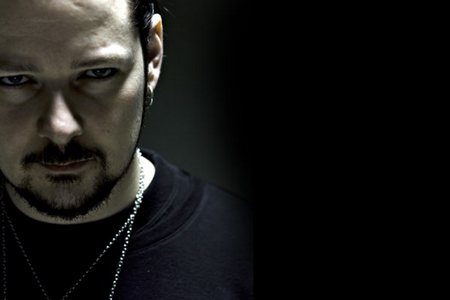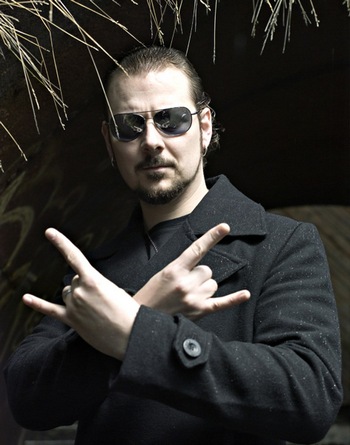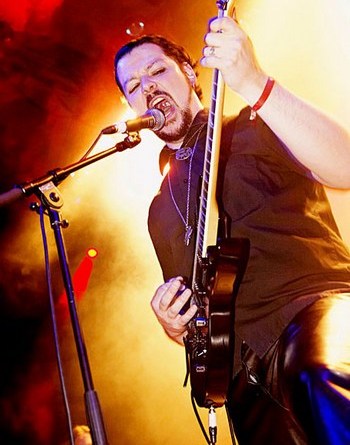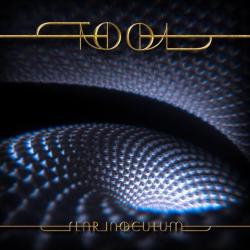
The Adversary - Interview with Ihsahn
BANDS : IhsahnIt's been five long years since Emperor frontman Ihsahn leant his unique talents to a full-on, red-blooded metal record. But fans can start rejoicing now, thanks to the imminent release of Ihsahn's first solo album The Adversary. Here he tells us all about the new album and how he fell back in love with the world of metal…
What made you decide to make another metal album after so long away from the genre?
Ihsahn: Well, the initial idea came a while after we quit Emperor. I started getting ideas that at some point I would do a metal album again. It's an idea that has been cooking for two or three years. I think that some of the reason why came because I was in contact with Rob Halford, about possibly doing something with him, and so it started out as a mix between wanting to do a solo album at some point but also I got in touch with him and we talked about doing something together. I started writing some material but it all went very slow because I was busy doing things with Peccatum, and that was my main focus at the time. It was all just a vague idea. It wasn't until from January 2005 that I really started to do the actual work. I basically wrote the main parts of the album, the basic songs, from January till March one year ago.
It's five years since Prometheus. How easy was it to get back into the swing of writing that kind of material?
Ihsahn: The main challenge was to get out of the experimental style of working that I'd been doing with Peccatum, because it's very easy when you only work in the studio to fiddle around with keyboard sounds and plug-ins and making effects and working on different sound textures, but that doesn't really make metal albums. I just have to set very strict borders, a frame to work within. I just started with a couple of guitar tracks and drum sequencing and some piano and they were the writing tools. I worked very chronologically. I wrote the first song (Invocation) first and carried on writing them in the order that they're presented on the album. I wrote all the songs and then I focussed on song number one, did the string arrangements and everything. I wrote the lyrics in that order, too. So it was very strict, almost a very military way of working. Very different from the very open structure we've used in Peccatum.
Did you bring anything to The Adversary that you learned while working with Peccatum?
Ihsahn: Oh, definitely. Much of Peccatum's work has been a learning process as well, particularly with learning about string arrangements and learning the written way of doing it. We studied a lot of composition and orchestration techniques and we've been taking lessons and doing studies. On this album I've just laid off the more experimental sounds, but all the work you do as a musician will influence you in one way or another. My experience with Peccatum has been invaluable in terms of my relationship to the craftsmanship of making music.
Is that the difference between artists like yourself and the general morass of mediocre metal bands out there?
Ihsahn: I don't know. I don't really know how other people write music. I get the impression that a lot of bands within this genre work with a method of building songs in rehearsals, and that's probably a very correct way of doing it in terms of keeping within a certain style. I've had that in mind, since I started doing a metal album, writing for the orchestra of a five-piece band. There are hardly three or four guitar parts on the album. It's kept to that line-up, plus string and keyboard arrangements. At least initially I felt very much into providing for that kind of ensemble. The reason I do music is because I love it as an artistic expression and a channel for my personal expression, but over the years I've begun to enjoy the craftsmanship of writing and producing and composition. It's such a long history of rules that you've got to break the music down into notes and technique. I'm a bit off the topic here, but when I was writing the tablature book for Emperor and transcribing the older songs after having studied compositional techniques and song structures, it was interesting to analyse what we did before we knew anything about any of that, to adapt the rules to it to see what we'd done unconsciously. So I guess the more I work in the studio and the more music I make, the more I learn and the more I get into the craftsmanship and the history of this kind of work.

Did you ever consider allowing someone else to produce the album for you or did you always intend to do it yourself?
Ihsahn: It was always the plan to do everything myself. When we toured the IX Equilibrium album with Emperor, we were approached by Ross Robinson, which I suppose was kind of fun, because he's produced all these big hit metal bands, and he seemed like a nice guy, but I guess I'm very particular with my own stuff. We'd cooperate with people who really know their stuff, but if I'd worked with a producer or an engineer like Ross Robinson, the album we produced would probably have more of a suitable production with strict levels and maybe it would even be lifted professionally, but I'm so afraid of compromising my vision. I'm very egocentric. I'm full of myself, basically! (laughs) It's very important for me to be a control freak with my own music. It's very hard for me to let go and let others have input into what I do, especially on a solo album. It's not that I'm against using producers. At some point it would be very interesting, especially to get a different perspective and to learn new stuff, but as for Emperor using Ross Robinson, we had our own sound and it was so strict already, it was really not a good idea to change anything. On this album I was very eager to do it all myself. I want to produce other artists in the future myself anyway, so I had to use myself as a guinea pig! (laughs).
Do you see The Adversary as a continuation of your work with Emperor or is it the start of something completely new for you?
Ihsahn: Not necessarily a continuation of Emperor, but I'd say it's the next step in my work as a musician. But since this is such a different album from what we did in Peccatum, I'd say it's a continuation of my work in the genre of metal. Obviously there will be an influential legacy there, from playing black metal with Emperor for ten years. That's been in my thoughts, but also from the years prior to that as well, my overall interest in metal. I really don't see that it's doing something new. To be honest, the way I've written the album and the expression and way of doing it, it's very similar to how I did the Prometheus album, but without the consideration for the specific expression that was Emperor. When I wrote Prometheus I took into account, not necessarily Samoth and Trym in particular, but I was writing music for Emperor and that had a certain progression so I couldn't do it as a solo album, it has to be for Emperor.
Has making a solo album been a liberating experience for you?
Ihsahn: Definitely. It's been very liberating. After having, for over five years, touched very new ground and tried to reach into areas that I hadn't really had any long experience with, going back to metal songs and writing for that kind of ensemble was very interesting. It was liberating in the way that I didn't have to consider anyone else, but also because I've had so much experience and written so much music over the years in metal, it was so easy in a way. I won't say it was easy to write the album, but there was a feeling of being in control of everything because I was doing something that I know I can do well. Also, being able to put in all those other things that would not have been suitable ingredients for things I've done in the past, but now I can take my Priest and King Diamond influences and put those in there too.
You can definitely hear the Andy LaRocque influence at the beginning of 'Called By The Fire'…
Ihsahn: Andy LaRocque is one of my favourite guitar players, particularly for that kind of riffing. I know it's common now to tune the guitars down one or two semitones, but I've always wanted to, just for nostalgia in a way, do something in a straight key with no down tuning.
Was it exciting to revisit the music that you listened to when you were a kid?
Ihsahn: Yeah! You know, I won't even mention some of the things from my musical past, but things that contain that energy and make you want to recreate that feeling. It's bits and pieces from memory, things I haven't heard for ten or fifteen years almost, they just lie there like old emotional treasures. You just pick them out. Maybe it's better not to listen to those songs again, they work better as a memory.

In a way, some of the new album is more accessible than Emperor. Did you make a conscious effort to make something that was distinct from what you've done before?
Ihsahn: My state of mind at the end of Emperor was reflected in Prometheus. It's not really a sharing album, is it? I just listened to it after two years or something, and it really sounds like an album that doesn't want to let you in. It builds up towards something pompous or some kind of release, but it just turns into something black and impenetrable. If people don't get into it that easily I can understand! For me personally, my reasons for quitting Emperor had a lot to do with keeping it to myself because there were so many people having opinions on what Emperor should be and what I should write and play or not. It lit that spark for a black metal guy! (laughs) I wanted to keep things for myself. I react very negatively to that kind of pressure. But this time I was very conscious about wanting to put the music out there and in metal tradition too. I wanted a pure expression. Called By The Fire is a heavy metal song all the way through, and Citizen is a full-on black metal song all the way through and Astera ton Proinon is a slow ballad-like thing all the way through. I didn't want to bring too many themes in. I wanted to use the different material in other forms in the same song rather than having different pieces stuck together. There are common rules in metal. It's intro, verse, refrain, verse, refrain, bridge, double refrain, fade-out (laughs). It's very much built the same as a regular sonata. So I've tried to keep to those kinds of rules, rules that will work within the form.
Clichés become clichés because they work, presumably…
Ihsahn: Yes, that's true. I suppose I've always wanted to do something that is new and special, but at a certain point I became so obsessed with the originality of what I should make that I threw away anything because I felt that anything I did, I'd done it before. This time I didn't really care. I went more with what came from the heart. If there are riffs or ideas on the album that sound like metal clichés then they just sounded right and I wanted to do things that way. I'm old now and I don't care if people are going to accuse me of anything!
Even if you were to use riffs that were perceived as being clichéd, the sound and style of your music tends to make what you do sound original anyway…
Ihsahn: Thank you. I hope so anyway! I do have my way of doing things. Now that this album is finished, there will always be things that I'd like to change and I'm sure I could have done something technically or sonically different, but I didn't care about that too much, although of course I wanted a good sound. I wanted to create a very powerful album, both lyrically and musically, something that will get to you, something that’s very honest and says something about something! (laughs).
The only other musician on The Adversary is Asgeir Mickelson, who plays drums. Why did you choose him?
Ihsahn: I knew from the start that I'd need a drummer. When the word got out there that I was making a solo album, he actually contacted me to offer his services. I know his work better from Spiral Architect than from Borknagar. I know both, of course, but I knew from that that he plays so differently in those two bands, that we would be capable of playing very progressive stuff and also black metal stuff. We were emailing back and forth and I found that we shared that Mikkey Dee is our favourite drummer, so I was sold. He's done a perfect job, too, from start to finish. He runs a Steinberg Nuendo studio too, so the process of exchanging files has been very easy and efficient. He's been a very good partner.

When did the title The Adversary come to you, and what's the overall concept behind it?
Ihsahn: The title came last, as it usually does with me. After going through all the lyrics, "The Adversary" seemed a very short but descriptive title for the whole thing. I suppose even within this black metal scene I see myself as an adversary to that as well, and also the whole album being influenced by a metal legacy that’s older than I am, the genre of rock'n'roll and metal and hard rock has always been an adversary to society. I have also returned to symbolic figures that are adversaries, whether it's Prometheus, Icaros, Lucifer, Cain or whoever. They're figures that defy the opinion of authority or the common mass. I feel that there are two main themes on the album. One is carrying a torch for all those Lucifers and Prometheuses out there through history, who have been cut down by the present time for having new ideas that everyone wants to be part of a hundred years later. I'm carrying a torch for new thinkers. It's also a harsh criticism of that exact grey mass, the lukewarm, those whose biggest ideal is to never have an opinion on anything or not to contribute to change or progress in any way.
Can you tell me a bit about the studios where you recorded the album?
Ihsahn: Most of the album, I recorded it at Symphonique Studio, which we have at home. Basically it's a digital set-up with a Steinberg Nuando being the main recorder and sequencer. We've got loads of synths and an outboard. I recorded everything there and then brought it to Jukejoint Studio in Notodden. Mnemosyne Productions has shares in the studio. So I went there to mix it, to get a new perspective but also to take advantage of all the analogue gear they have there. It's all from the '50s, '60s and '70s. For studio enthusiasts, you can find most of the classics there! The mixer I mixed it on was originally from Stax Studio in Memphis. That has a legacy too, I suppose. It's good old analogue gear. It was good to have that different set-up. Maybe next time I will do it the other way round: record it there and mix it at home.
Describe the process of piecing The Adversary together…
Ihsahn: The real work started in January last year. I wrote the skeleton of all the songs with two guitar tracks, programmed drums and piano and that took until March. Then bit by bit, starting chronologically, I began with different arrangements and working on bass parts and keyboard parts and string arrangements. When all the songs were finished from A to B, I started sending files to Asgeir. I had a three month break during the summer because it's hard to get black metal work done during the hot weather! (laughs) Then starting in the autumn again, Asgeir was continually recording drums and sending MP3 files with raw mixes, with his interpretation of my programming. We'd email back and forth until I got the results I wanted, and then he would just upload the files for me and I would put them into my arrangement. He would do that while I was recording guitars and writing the final lyrics throughout the autumn. I finished recording and right after New Year I aimed to start mixing.
Has everything gone to plan?
Ihsahn: In October or November I was put back a month because of a computer crash. We had to buy a new one, which was supposed to take a week but ended up taking three or four weeks. That's fairly typical. Apart from that it's just been about putting in the hours and working hard.

Tell me about each track on the album, starting with 'Invocation'…
Ihsahn: It was always intended to start the album. Musically it's a thrash-like black metal song. It's got a certain groove. It's rather straightforward. Lyrically, it starts off the album playing with traditional elements of the genre but giving them, hopefully, some new meaning.
Called By The Fire: It's a more straightforward heavy metal song. That was the intention. I wanted to start the album with two different songs like that build up the mood. This is basically a song about my perception of having been doing this kind of expression for so long, and feeling that call, that it’s almost a duty to do this, and that I don't really have a choice. It's such a strong calling.
Citizen: This is a really, really hard black metal song. Lyrically, It's a very hard criticism of the lukewarm in society.
Homecoming: I wanted to continue the contrasts, so this is a progressive song. I initially did some test vocals on it, but they ended up being in a style that suited Garm from Ulver very well, so he ended up singing on that one. I thought it would be good for him to sing on one of my albums for once. I've sung for Ulver and Arcturus before, so it's payback time! The lyric is a contemplation, a feeling of having returned to a starting point with a new perspective.
Astera ton Proinon: The title means "Morning Star". That's my interpretation of a black metal ballad. Again, this song is a tribute to the visionary thinker, personified.
Panem et Circenses: Again, this is a black metal song, but with a circus twist! (laughs) The title means "Bread and Circus". It deals with the rather hypocritical sensationalism that people love. The hate/love relationship that people have with extremes, and how people devour it. People want the extreme so they can hate it. I think I explained this much better in the lyric itself! (laughs).
And He Shall Walk In Empty Places: The album hardens towards the end. The songs become more and more extreme at this point. It's a hard black metal-sounding song. It has a long groovy section in the middle of the song. Lyrically, it deals with people who are ahead of the rest of the world and who want to bring about progress, but who have to walk alone around this circle that feels never-ending.
Will You Love Me Now?: It's not a traditional black metal title, is it? Musically, it’s very hard extreme metal. Lyrically, I guess it confronts conservatism. Using a title like that confronts the conservative elements within this genre. It's saying that when I put something out there for people to have opinions about and to relate to, when I get to the heart of things, when the truth comes out, when I speak directly, saying what it really is without the fantasy and the mysticism, will you love me then? Can people relate to things for what they are? Even Asgeir, when I told him the title, reacted a bit strangely! (laughs) It's not just my intention to provoke and to be different, but I see the same things that piss me off in society in this so-called progressive scene, and that they are as much following the rules and thinking the way they believe they're supposed to think. The whole idea is to try to make up your mind on your own, and be truthful, at least to yourself.
The Pain Is Still Mine: It's an epic! I know it's rather ambitious, but the kind of elements that it plays on have been done many times before, with much greater resources than I have, but still I wanted to capture that kind of feeling. Lyrically, I suppose that instead of all this criticism, this almost supernatural, arrogant feel that runs through the album, this last song reflects on that pain that makes me deal with this kind of expression as an artist. It reflects on the very emotional side of things. The reason for doing this, this constant drive for doing what I do, I just know I want to throw everything that I have into it. I have to confront the pain to be able to do it, but I'd rather that than to just hide it all away. I feel that in the music industry, even within this extreme genre, everything has become superficial. The source of what I do, it comes from a lot of soul-searching. It sounds very dramatic, but it is very dramatic! It comes at a price, to search yourself, all the dark corners of yourself, to bring out that kind of expression. I wrote the song almost as an acknowledgement for myself, that this is how it all works.
Dom Lawson
Kerrang










 Posteaza pe pagina mea de Twitter
Posteaza pe pagina mea de Twitter Posteaza pe pagina mea de Facebook
Posteaza pe pagina mea de Facebook Posteaza pe pagina mea de MySpace
Posteaza pe pagina mea de MySpace Trimite pe YM
Trimite pe YM Trimite pe email
Trimite pe email



Comment on: The Adversary - Interview with Ihsahn